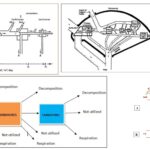What is telomere biology disorder?
What is telomere biology disorder?
Please login to submit an answer.
Telomere biology disorders (TBDs) are a group of genetic conditions that arise from defects in the maintenance and function of telomeres or telomerase. These disorders are typically characterized by premature aging, shortened telomeres, and an increased risk of age-related diseases. Individuals with TBDs often experience symptoms that resemble those of accelerated aging, such as skin abnormalities, bone marrow failure, lung fibrosis, and other organ dysfunctions. Many of these disorders are caused by mutations in genes encoding telomere-maintenance proteins, including components of telomerase, the enzyme responsible for adding repetitive sequences to the telomeres. Examples of telomere biology disorders include dyskeratosis congenita, aplastic anemia, and certain forms of idiopathic pulmonary fibrosis. In these conditions, telomeres shorten at an abnormally rapid rate, leading to early-onset age-related diseases and increased susceptibility to cancer.
- Share on Facebook
- Share on Twitter
- Share on LinkedIn
Helpful: 0%




